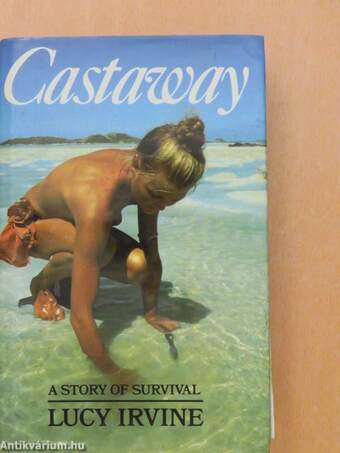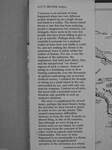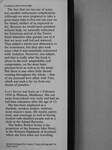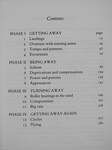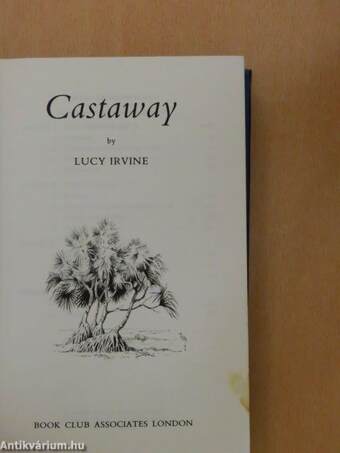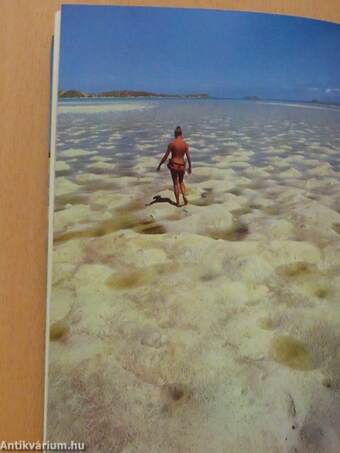1.062.356
kiadvánnyal nyújtjuk Magyarország legnagyobb antikvár könyv-kínálatát

VISSZA
A TETEJÉRE
JAVASLATOKÉszre-
vételek
Castaway
| Kiadó: | Book Club Associates |
|---|---|
| Kiadás helye: | London |
| Kiadás éve: | |
| Kötés típusa: | Vászon |
| Oldalszám: | 287 oldal |
| Sorozatcím: | |
| Kötetszám: | |
| Nyelv: | Angol |
| Méret: | 20 cm x 13 cm |
| ISBN: | |
| Megjegyzés: | Fekete-fehér illusztrációkkal, színes fotókkal. |
naponta értesítjük a beérkező friss
kiadványokról
naponta értesítjük a beérkező friss
kiadványokról
Fülszöveg
Jj.
LUCY IRVINE writes:
'Castaway is an account of what happened when two very different people teamed up on a single dream and made it a reality. The desert island dream is one that has been seducing people's imagination for centuries, yet strangely, there seem to be very few people who have been willing to give it a go in real life. Perhaps those who consider it seriously for a moment realise at once how non-idyllic it could be, and not wishing the dream to be punctured, leave it safely within the realms of fantasy. For me, it was the element of the unknown, the unplanned, that held most allure; that, and the unequivocal "no choice" aspects of such a venture. Instead of sitting in a bedsitting room in Kew fretting confusedly over the thousands of options confronting one in normal civilized society, I relished the thought of sitting on a small island in the sun, surrounded by sea, and with only one man for company. Limited on all sides, but faced with a potential sense of... Tovább
Fülszöveg
Jj.
LUCY IRVINE writes:
'Castaway is an account of what happened when two very different people teamed up on a single dream and made it a reality. The desert island dream is one that has been seducing people's imagination for centuries, yet strangely, there seem to be very few people who have been willing to give it a go in real life. Perhaps those who consider it seriously for a moment realise at once how non-idyllic it could be, and not wishing the dream to be punctured, leave it safely within the realms of fantasy. For me, it was the element of the unknown, the unplanned, that held most allure; that, and the unequivocal "no choice" aspects of such a venture. Instead of sitting in a bedsitting room in Kew fretting confusedly over the thousands of options confronting one in normal civilized society, I relished the thought of sitting on a small island in the sun, surrounded by sea, and with only one man for company. Limited on all sides, but faced with a potential sense of freedom only possible in such an exclusive situation.
The story is complicated by several issues, perhaps the most bizarre being the fact that we were forced to marry in order to live out the dream. This created unnecessary difficulties between us from the start. It seems an absurd thing, in this of all centuries, that although we were living in a lawless state on our island, we could not escape from the concepts of the other world as regards man/woman relationships. The story of what happened to us emotionally is a theme underlying the straightforward narrative of the adventure as a whole.
Continued on back flap
/
v-i TEN'
fc^EiT-
Continued from front flap
The fact that we ran out of water was another unforeseen compHcation. Although we were prepared to take a great many risks to live out our year on the island, neither of us expected to die. Because we would have perished without help, we naturally welcomed the fortuitous arrival of the Torres Strait Islanders who quickly saw to it that we were well fed and watered. They added a whole new dimension to the experience, but they also took away what it was essentially concerned with: isolation. However, one adapts, and that is really what the book is about in the end: adaptabiUty and compromise, on the most basic physical level as well as in the mind. But there is one other Uttle thread running throughout the whole, - that of my personal love affair with Tuin, which was such a far cry from any dream of paradise.'
P .
I li.
Lucy Irvine was born on 1 February 1956 in Whitton, Middlesex. She ran away from school very early and had no full-time education after the age of 13.
She has been employed as a charlady, monkey keeper, waitress, stone mason's mate, life model, pastry cook, and concierge as well as having worked with disabled people and as a clerk at the Inland Revenue.
Her father Robert Irvine is the proprietor of the Summer Isles Hotel, in the Western Highlands of Scotland, where she lives when not travelling.
Jacket designed by Lesley Craig; photograph by Gary Steer Vissza
Témakörök
- Idegennyelv > Idegennyelvű könyvek > Angol > Szépirodalom > Regény, novella, elbeszélés
- Szépirodalom > Regény, novella, elbeszélés > Az író származása szerint > Európa > Nagy-Britannia
- Szépirodalom > Regény, novella, elbeszélés > Tartalom szerint > Földrajzi besorolások > Ausztrália, Óceánia
- Szépirodalom > Regény, novella, elbeszélés > Tartalom szerint > Hajós történetek
- Szépirodalom > Regény, novella, elbeszélés > Tartalom szerint > Lélektani regények
- Szépirodalom > Regény, novella, elbeszélés > Tartalom szerint > Életrajzi regények > Önéletrajzok, naplók, memoárok
- Szépirodalom > Regény, novella, elbeszélés > Tartalom szerint > Filmregények
- Szépirodalom > Regény, novella, elbeszélés > Tartalom szerint > Útikalandok, útirajzok
Lucy Irvine
Lucy Irvine műveinek az Antikvarium.hu-n kapható vagy előjegyezhető listáját itt tekintheti meg: Lucy Irvine könyvek, művekMegvásárolható példányok
Nincs megvásárolható példány
A könyv összes megrendelhető példánya elfogyott. Ha kívánja, előjegyezheti a könyvet, és amint a könyv egy újabb példánya elérhető lesz, értesítjük.



